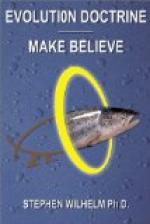V
THE PHYSICAL EVOLUTION OF THE HUMAN SPECIES AND OF HUMAN RACES
The teachings of science that relate to the origin and history of the human species constitute for us the most important part of the whole doctrine of organic evolution and now, having completely outlined this doctrine as a general one, we are brought to the point where we must deal frankly and squarely with the insistent questions arising on all sides as to the way that mankind is involved in the vast mechanism of nature’s order. These questions have been ignored heretofore, in order that the natural history of animals in general might be discussed without any interference on the part of purely human interest and concern. It now becomes our privilege, and our duty as well, to employ and apply the principles we have learned in order to understand more completely the origin of the human body as an organic type, the history of human races, the development of human faculty and of social institutions, and the evolution finally of even the highest elements of human life. These are scientific problems, and if we are to solve them we must employ the now familiar methods of science which only yield sure results.
We must not underestimate the many difficulties to be encountered, for the field before us is a vast territory of complex human life and of manifold human relations. Without prolonged exercise in scientific methods, it is impossible to view our own kind impersonally, as we do the creatures of lower nature. Furthermore it seems to many that an analysis of human life and biological history, even if it is possible, must alter or degrade mankind in some degree; this is no more true than that a knowledge of the principles of engineering according to which the Brooklyn Bridge has been constructed renders that structure any different or unsafe for travel. Man remains man, whether we are in utter ignorance of his mode of origin, or whether we know all about his ancestry and about the factors that have made him human. It is because our species appears to occupy a superior and isolated position above the rest of nature that the mind seems reluctant to follow the guidance of science when it conducts its investigations into the history of seemingly privileged human nature. And it is feared also, that if evolution is proven for man as well as for all other kinds of animals, our cherished ideas and our outlook upon many departments of human life must be profoundly affected. This may be so, but science endeavors only to find out the truth; it cannot alter truth, nor does it seek to do so. We might well wish that the world were different in many respects and that we were free from the control of many natural laws besides that of evolution, but if the real is what it is, then our duty is plain before us; as we think more widely and deeply on the basis of ripened experience, it becomes ever clearer that a knowledge of human history gives the only sure guidance for human life.




